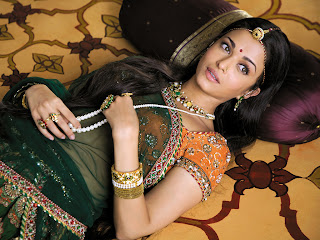The movie Jodhaa Akbar is not about her. It is about Emperor Akbar, Jahangir's father, and one of his wives, notable for being Hindu, and I believe she was in fact Jahangir's mother. But Akbar does feature pretty prominently in the first book, The Twentieth Wife (though Jodha Bai is mentioned only once, and not by that name), and after feeling like I had spent a good deal of time in Mughal India via the written word, I thought it would be nice to see a cinematic rendition of that world.
First brief reactions:
*You don't want to be the target of an elephant on the battlefield.
*Hrithik Roshan is an extremely attractive man.
*Proof that actors don't have to get naked to portray a sensual romance.
*I loved it!
This movie, at 3.5 hours, was a not inconsiderable investment of my time, but I was totally, blissfully involved. Nary a boring moment. Aishwarya was, as always, stunning. She also gives a lovely performance in a strong role (and, for a bonus, we get to see her sword-fighting, which was very fun). This was my first view of Hrithik, and he is definitely easy on the eyes (see first reactions above).
This is the story of Emperor Akbar marrying Jodhaa Bai, a Hindu princess, as a political alliance, and how they come to truly love each other. It is mainly a romance, with the intrigues of the empire as a backdrop. It is full of color and has beautiful costumes and music. And did I mention that I loved it?
Netflix has been pushing Jodhaa Akbar at me for some time, but I'm actually glad I waited on this one. Some things I would have found very confusing without having read Sundaresan's books, like the fact that he's not called Akbar at all for most of the movie. Thanks to The Twentieth Wife and The Feast of Roses, I knew that names were changed and added at important times throughout the lives of important Mughal figures, so I wasn't left scratching my head, just pleasantly wondering when the "Akbar" would come. Another small example is when they show Akbar sitting in one side of a large balancing scale while they pile gold and treasure into the other side. No explanation is given, so it's only through the reading I had recently done that I knew this was something done at celebrations or perhaps generally auspicious times, and that "his weight in gold" was to be distributed to the common people. And all-in-all, I just have the sense that I had an easier time following what was going on with all the politics and battles and what-not having read those books.
On the other hand, I'm fairly certain not being a scholar on Mughal India is a good thing when it comes to enjoying this film. The (very) small amount of reading I have done makes it clear that this wasn't an entirely accurate representation. For example, where is the rest of his harem? Conveniently absent, but the onscreen presence or even the allusion to more wives (not to mention concubines- and isn't that a horrible sounding word?) would have been to great detriment to the romance. And I love the romance, so I am glad they skipped the historical accuracy there. Hrithik and Aishwarya did a fabulous job portraying the gradual rise in both physical attraction and actual respect and affection, and the will-they/won't-they tension was delicious.
One of the things I love about this romp through Indian cinema I've been taking is the enjoyable cumulative effect of things making more sense because of other things that I've seen already, or, conversely, discovering something that illuminates something I've seen before. Two such instances from this viewing experience:
On their wedding night, Jodhaa is standoffish and tells him she married him for her people, but her heart is not ready to accept him. He tells her that according to the laws of Islam, if a wife is not happy she can divorce her husband. She replies that that may be true in his traditions, but as a Hindu she believes the bonds of marriage last "for seven lifetimes." Light bulb moment! So that's why, in Hum Dil De Chuke Sanam,
(SPOILER ALERT)
Also, after having listened to the soundtrack from Ek Tha Tiger for the last few months, especially this song, and having gone to the Bollymeaning site (love that place) and read this very nice explanation of what the title word "Mashallah" means, it was very fun for me when, during their mostly playful sword-fight, Akbar removes the scarf from Jodhaa's face and then exclaims appreciatively, "Mashallah!" I was grinning like a little kid, thinking, "Hey, I know what that means!"
But maybe I'm easily excited.
Easily excited or not, this film was a treat! If you like romance at all, not to mention beautiful costumes, battles, intrigue, scheming, excellent music, a compelling sense of glimpsing an exotic time and place, and, well, most of all, romance- then you're in for a good time! Have fun and think of me when you hear him say "Mashallah!"


























